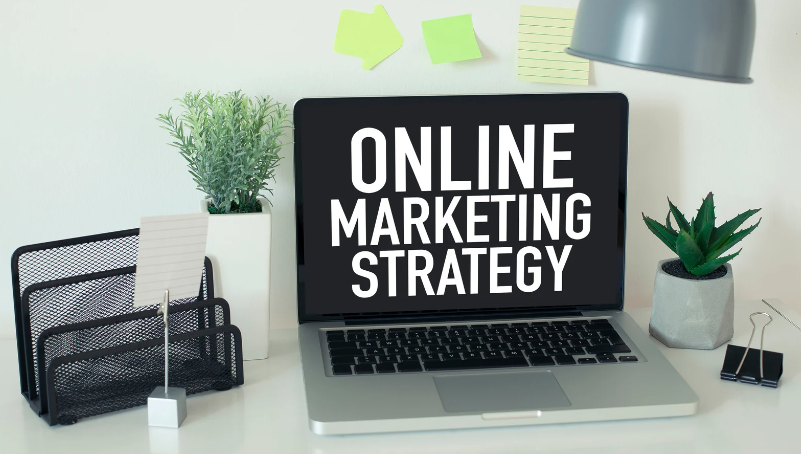Billions of people are online every single day. That’s a huge potential customer base you can’t afford to miss! Online marketing offers powerful ways to reach your target audience without breaking the bank. You can also showcase your brand’s unique personality and get people talking about your business. Online marketing is like a magic formula to drive traffic to your website, convert browsers into buyers, and watch your business thrive.
All of these can feel a bit overwhelming, so where do we begin? Let’s find out.
Benefits of Online Marketing for Small Businesses
Small businesses can reap significant advantages from embracing online marketing strategies. Here are some of the key benefits that make online marketing indispensable for small businesses:
1. Cost-Effective
Small businesses often operate on tight budgets, making traditional advertising methods like TV commercials or print ads financially challenging. Online marketing, however, offers a cost-effective alternative. Many online marketing channels, such as social media and content marketing, require minimal upfront investments and can be tailored to your budget. This affordability allows small businesses to compete on a level playing field with larger competitors.
2. Global Reach
One of the most compelling aspects of online marketing is its potential to reach a global audience. Unlike traditional brick-and-mortar stores that are limited by their physical location, the internet knows no boundaries. By establishing a strong online presence, your small business can transcend geographical constraints and tap into a vast international market. This expansion of your customer base can lead to increased revenue and growth opportunities.
3. Targeted Marketing
Online marketing tools provide unprecedented precision when it comes to targeting specific demographics. Whether you want to reach a particular age group, geographic area, or people with specific interests, online marketing allows you to tailor your campaigns accordingly. This targeted approach ensures that your marketing efforts are focused on reaching the most relevant potential customers, increasing the likelihood of conversion and sales.
4. Measurable Results
One of the key advantages of online marketing is its ability to provide detailed analytics and data tracking. Unlike traditional marketing methods, where measuring ROI can be challenging, online marketing platforms offer robust reporting tools. You can track metrics such as website traffic, click-through rates, conversion rates, and more. This data-driven approach empowers small businesses to assess the effectiveness of their campaigns in real time. By analyzing these metrics, you can make informed decisions, optimize your strategies, and allocate resources to the most successful marketing channels.
Setting the Foundation
Before launching into the dynamic world of online marketing, it’s essential to establish a solid foundation. At the core of this foundation is understanding and defining your target audience. This is a critical step because your entire online marketing strategy will revolve around connecting with the right people who are most likely to become your customers.
Identifying Your Target Audience
- Conduct Market Research: Begin by conducting thorough market research. Explore your industry, competitors, and the broader market landscape. Identify trends, gaps, and opportunities within your niche.
- Customer Personas: Create detailed customer personas that represent your ideal customers. These personas should include demographic information (age, gender, location), psychographic data (interests, values, lifestyle), and behavioural traits (online habits, purchasing behaviour).
- Understanding Pain Points: Dive deep into your potential customers’ pain points, challenges, and needs. What problems can your product or service solve for them? Understanding these pain points will help you tailor your marketing messages effectively.
- Surveys and Feedback: If you already have existing customers, gather feedback from them through surveys or interviews. Ask about their experiences, what they value in your offerings, and why they chose your business.
- Competitor Analysis: Analyze your competitors’ customer base. Who are they targeting, and how are they connecting with their audience? This can provide insights into potential opportunities.
How This Knowledge Guides Your Marketing Strategies
Once you’ve defined your target audience, you can shape your online marketing strategies accordingly:
- Content Creation: Create content that speaks directly to your audience’s interests and addresses their pain points. This could include blog posts, videos, infographics, or social media content.
- Advertising: Utilize online advertising platforms to reach your target audience precisely. With defined demographics and interests, you can ensure that your ads are seen by those most likely to engage with your business.
- Social Media Engagement: Tailor your social media presence to match the platforms your audience frequents. Share content that resonates with their interests and engage with them through comments, likes, and shares.
- Email Marketing: Segment your email lists based on audience characteristics and preferences. This allows you to send personalized messages that are more likely to convert.
Setting Clear Marketing Goals
While understanding your audience is pivotal, it’s equally crucial to set clear and measurable marketing goals. Without these goals, it’s challenging to gauge the success of your online marketing efforts or to align them with your broader business objectives.
Define Clear and Measurable Goals
- Specificity: Your goals should be specific and well-defined. For example, instead of a vague goal like “increase website traffic,” aim for something more precise, such as “increase monthly website traffic by 20%.”
- Measurability: Ensure that your goals are measurable. You should be able to track progress and determine whether you’ve achieved them. Use quantifiable metrics like website visits, leads generated, or sales conversions.
- Relevance: Your marketing goals should align with your overall business objectives. Ask yourself how achieving these goals will contribute to the growth and success of your business.
- Time-Bound: Set deadlines for achieving your goals. For example, aim to achieve a certain number of leads or sales within a specific time frame, such as “generate 100 new leads within the next three months.”
The Role of Goals in Your Online Marketing Strategy
Clear and measurable marketing goals play a pivotal role in shaping your online marketing strategy:
- Focus and Prioritization: Goals help you prioritize your marketing efforts. You can allocate resources and efforts to the strategies that are most likely to help you achieve your objectives.
- Measurement and Optimization: With specific goals in place, you can track your progress using analytics tools. If you’re falling short of your goals, you can adjust your strategies and tactics to improve performance.
- Motivation and Accountability: Goals provide motivation for you and your team. They create a sense of purpose and a clear target to strive for. Regularly reviewing progress against these goals holds you accountable for your marketing efforts.
How to Increase Your Online Presence
Creating a Professional Website
Your website serves as your online storefront, making it one of the most critical elements of your online marketing strategy. Your website also serves as the hub for your online marketing activities. It’s where you direct traffic from various online channels to engage with your brand. Whether it’s through blog posts, landing pages, or product listings, your website plays a central role in converting visitors into customers.
Here’s how to ensure your website makes the right impression:
- Professional Design: Invest in a professional website design that reflects your brand identity. Your site’s appearance should be visually appealing and align with your business’s values and goals.
- User-Friendly Navigation: Ensure that your website is easy to navigate. Organize content logically, use clear menus, and include a search function to help visitors find what they’re looking for quickly.
- Responsive Design: Make sure your website is responsive, meaning it adapts seamlessly to different screen sizes, including desktops, tablets, and smartphones. Mobile optimisation is critical as an increasing number of users access websites via mobile devices.
- Engaging Content: Populate your website with engaging, informative, and relevant content. This includes compelling product or service descriptions, blog posts, videos, and images. High-quality content not only informs but also builds trust with your audience.
- Contact Information: Make it easy for visitors to contact you. Include a contact page with a contact form, email address, phone number, and physical address if applicable. Provide multiple communication options to cater to diverse preferences.
- Loading Speed: Optimise your website for fast loading times. Slow websites can deter visitors and negatively impact your search engine rankings.
- Security: Ensure your website is secure by implementing SSL certificates and other security measures to protect user data.
- Call to Action (CTA): Include clear and strategically placed calls to action throughout your site. CTAs prompt visitors to take specific actions, such as signing up for a newsletter, purchasing, or requesting more information.
Optimising for Search Engines (SEO)
Search engine optimisation (SEO) is essential for improving your website’s visibility on search engines like Google. Here’s how to make your site search engine friendly:
- Keyword Research: Conduct thorough keyword research to identify the phrases and terms your target audience uses to search for products or services similar to yours. Use keyword research tools to discover relevant keywords with high search volume and moderate competition.
- On-Page SEO: Optimise individual pages on your website by incorporating target keywords naturally into titles, headings, meta descriptions, and content. Ensure that your website structure is well-organised and easy to crawl by search engine bots.
- High-Quality Content: Create high-quality, valuable, and original content that addresses the needs and interests of your audience. Regularly update your content to keep it fresh and relevant.
- Backlink Building: Build a diverse and authoritative backlink profile by earning links from reputable websites in your niche. Quality backlinks enhance your website’s credibility and boost its ranking in search results.
- Mobile Optimisation: As mentioned earlier, ensure that your website is mobile-friendly. Google prioritises mobile-responsive sites, and a mobile-friendly design is essential for SEO success.
- Page Speed: Improve your website’s loading speed, as faster websites tend to rank higher. Compress images, use browser caching, and minimise HTTP requests to achieve faster load times.
- Technical SEO: Conduct technical SEO audits to identify and fix issues such as broken links, duplicate content, and crawl errors. Ensure your website’s XML sitemap is correctly set up for search engines to index your pages effectively.
Content Marketing
At its core, content marketing is the art of creating valuable and relevant content to attract, engage, and ultimately convert your target audience into loyal customers. Here are the key aspects to grasp:
- Value-Centric: Content marketing is not about pushing products or services directly. Instead, it focuses on providing valuable information, solving problems, or entertaining your audience. This builds trust and positions your brand as a reliable resource.
- Diverse Formats: Content can take many forms, such as blog posts, videos, podcasts, infographics, ebooks, and more. The choice of format should align with your audience’s preferences and the nature of the content.
- Audience-Centric:The foundation of content marketing is understanding your audience’s interests, pain points, and needs. Your content should resonate with them and offer solutions to their problems.
- Consistency: Consistency is key in content marketing. Regularly publishing and promoting content helps maintain audience engagement and builds brand credibility over time.
Creating Valuable and Engaging Content
To succeed in content marketing, it’s essential to create content that captivates your audience’s attention and delivers real value. Here’s how:
- Identify Audience Needs: Start by understanding what your target audience cares about. What questions do they have? What problems can you help them solve? Conduct surveys, analyse data, and engage with your audience to gather insights.
- Quality Matters: High-quality content is essential. It should be well-researched, accurate, and free of errors. Invest in creating content that demonstrates your expertise and authority in your industry.
- Variety of Content: Don’t limit yourself to one type of content. Diversify your content portfolio to cater to different learning styles and preferences within your audience. Mix written content with visuals, videos, and interactive elements.
- Educate, Entertain, Solve: Content should aim to educate, entertain, or solve problems. It can provide answers to common questions, offer how-to guides, share industry insights, or even tell compelling stories that resonate with your audience.
- Unique Voice: Develop a unique voice and tone for your content that reflects your brand’s personality and values. A consistent voice helps build recognition and trust.
- Keyword Optimisation: Incorporate relevant keywords naturally into your content to improve its search engine visibility. However, avoid keyword stuffing, which can harm the user experience.
- Clear Calls to Action (CTAs): Encourage user engagement by including clear CTAs in your content. Whether it’s signing up for a newsletter, downloading a resource, or making a purchase, CTAs guide your audience toward the desired action.
Content Promotion and Distribution
Creating valuable content is just the beginning; you must also promote it effectively to ensure it reaches your target audience:
- Social Media: Share your content on social media platforms where your audience is active. Craft compelling posts that encourage likes, shares, and comments. Engage with your audience to build a community around your content.
- Email Marketing: Email marketing is used to notify subscribers about new content. Segmentation allows you to send targeted emails to specific groups interested in particular topics.
- SEO: Optimise your content for search engines by using relevant keywords and creating high-quality backlinks. This boosts your content’s visibility in search results.
- Content Syndication: Consider syndicating your content on reputable platforms or partnering with industry influencers to amplify its reach.
- Guest Posting: Write guest posts for other relevant blogs or websites in your industry. This exposes your content to a broader audience and can help you build backlinks.
- Repurposing: Repurpose your existing content into different formats. For example, transform a blog post into a video or an infographic to reach a wider audience.
Social Media Marketing
- Leveraging Social Media Platforms: Choose the social media platforms most relevant to your business and target audience. Create profiles, optimise them, and start sharing valuable content. Social media can help you build brand awareness, connect with customers, and drive traffic to your website.
- Developing a Social Media Strategy: Plan your social media activities with a content calendar. Define posting schedules, content types, and engagement strategies. Monitor your social media metrics to refine your approach and better connect with your audience.
- Engaging with Your Audience: Respond to comments, messages, and mentions promptly. Engage with your followers by asking questions, conducting polls, and running contests. Building a community around your brand fosters customer loyalty.
Email Marketing
- Building an Email List: Build an email list by offering value in exchange for subscribers’ contact information. Segment your list to send targeted messages, such as newsletters, promotions, and personalised recommendations.
- Crafting Effective Email Campaigns: Design compelling email campaigns with attention-grabbing subject lines and mobile-friendly layouts. Monitor open rates and click-through rates to refine your email strategy and provide valuable content to your subscribers.
- Email Marketing Best Practices: Follow email marketing best practices, including obtaining permission to send emails, providing unsubscribe options, and respecting privacy regulations like GDPR. Deliver content that is relevant, timely, and valuable to your subscribers.
Paid Advertising
- Google Ads and Facebook Ads: Understand the differences between these platforms, including targeting options, ad formats, and bidding strategies. Create compelling ad copy and visuals to maximise your ROI.
- Budgeting and Measuring ROI: Allocate your advertising budget wisely and track key metrics like click-through rate (CTR), conversion rate, and return on investment (ROI). Adjust your campaigns based on performance data to optimise results.
Analytics and Data
- Monitoring Your Online Marketing Efforts: Regularly monitor the performance of your online marketing campaigns using analytics tools like Google Analytics. Track website traffic, user behaviour, and conversion rates to identify areas for improvement.
- Key Performance Indicators (KPIs): Define key performance indicators (KPIs) based on your marketing goals. Common KPIs include website traffic, conversion rate, customer acquisition cost (CAC), and customer lifetime value (CLV).
- Using Data to Improve Strategies: Analyse data to make informed decisions. Adjust your strategies based on what works and what doesn’t. Experiment with different approaches and continually refine your online marketing efforts.
Online Marketing Tools and Resources
To excel in online marketing, you need the right set of tools and resources to streamline your efforts, analyse performance, and stay ahead of the competition. Here’s a look at essential online marketing tools and the benefits of joining online marketing communities and forums:
Essential Online Marketing Tools
- Social Media Management Tools: Platforms like Hootsuite, Buffer, and Sprout Social allow you to schedule and manage your social media posts across various networks. They also provide analytics to track engagement and performance.
- Email Marketing Platforms: Tools like Mailchimp, Constant Contact, and HubSpot Email Marketing enable you to create, send, and track email campaigns. They often offer automation features for personalised email sequences.
- Content Management Systems (CMS): CMS platforms like WordPress, Joomla, and Drupal are essential for building and managing your website. They offer user-friendly interfaces, customisable templates, and plugins for additional functionality.
- Keyword Research Tools: Tools like Google Keyword Planner, SEMrush, and Ahrefs help you identify relevant keywords for your content and analyse keyword competitiveness.
- Analytics and Tracking: Google Analytics is a must-have tool for tracking website traffic, user behavior, and conversion rates. It provides valuable insights into the effectiveness of your online marketing efforts.
- Search Engine Optimisation (SEO) Tools: Moz, Yoast SEO, and Screaming Frog are popular tools for optimising your website’s SEO. They offer features like on-page analysis, backlink monitoring, and technical SEO audits.
- Graphic Design Software: Adobe Creative Cloud, Canva, and Snappa allow you to create visually appealing graphics, infographics, and other design assets for your online marketing campaigns.
- Email List Building Tools: Tools like OptinMonster and Sumo help you grow your email subscriber list by creating eye-catching opt-in forms and pop-ups.
- Marketing Automation Platforms: Platforms like Marketo and Pardot offer advanced marketing automation capabilities, including lead nurturing, lead scoring, and customer journey mapping.
- Paid Advertising Platforms: If you’re running paid ad campaigns, tools like Google Ads, Facebook Ads Manager, and LinkedIn Ads provide the necessary interfaces to manage and optimise your ad spend.
Online Marketing Communities and Forums
In addition to utilising tools, connecting with experts and peers in online marketing communities and forums can be invaluable:
- Digital Marketing Subreddits: Reddit hosts several subreddits dedicated to digital marketing, such as r/marketing and r/SEO. These communities are excellent places to ask questions, share insights, and stay updated on industry news.
- LinkedIn Groups: Join LinkedIn groups related to online marketing, such as “Digital Marketing,” “Content Marketing Institute,” or industry-specific groups. These groups often feature discussions, articles, and networking opportunities.
- Quora: Participate in marketing-related discussions on Quora to answer questions, share expertise, and establish yourself as a thought leader in your niche.
- MarketingProfs Community: MarketingProfs offers a community where marketers can connect, ask questions and access resources. It’s a great platform for learning and networking.
- Inbound.org: Inbound.org is a community of inbound marketers sharing articles, discussions, and insights about online marketing trends and strategies.
- Industry-Specific Forums: Depending on your industry, there may be niche forums or communities where professionals gather to discuss marketing strategies and trends specific to your field.
How UDS Can Help Your Business
Are you ready to take your online marketing efforts to the next level and boost your business to success? Ubique Digital Solutions will effectively market your business online using HubSpot’s Marketing Hub where you can leverage its comprehensive suite of tools designed for inbound marketing, content management, and customer engagement. Reach out to us to get started.
FAQs
Q: What Is Online Marketing, and Why Is It Important for Beginners?
Online marketing refers to the use of digital channels and strategies to promote and grow a business. It’s essential for beginners because it provides cost-effective ways to reach a broad audience, increase brand visibility, and drive sales in today’s digital world.
Q: How Can I Identify My Target Audience for Online Marketing?
Identifying your target audience involves conducting market research to understand their demographics, preferences, and behaviour. You can use tools like Google Analytics and social media insights to gather data and create customer personas.
Q: What Are Some Cost-Effective Ways to Create a Professional Website?
You can create a professional website on a budget by using website builders like WordPress, Wix, or Squarespace. These platforms offer templates and easy-to-use tools for designing and customising your site.
Q: What Are the Basic Principles of Search Engine Optimisation (SEO)?
SEO involves optimising your website and content to rank higher on search engine results pages. Key principles include keyword research, on-page optimisation, high-quality content creation, and building quality backlinks.
Q: How Can I Create Valuable and Engaging Content for My Target Audience?
To create valuable content, research your audience’s needs and interests and address their pain points. Craft engaging content by using storytelling, visuals, and interactive elements that captivate your audience.
Q: What Social Media Platforms Should I Focus on for My Business?
Focus on social media platforms that align with your target audience’s demographics and interests. Popular choices include Facebook, Instagram, Twitter, LinkedIn, and Pinterest. Choose platforms where your audience is most active.














